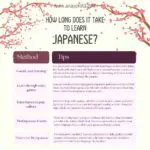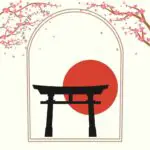This post may contain affiliate links. Please read my disclosure policy for more info.
There is no doubt about it: learning a new language will take a long time. But how long does it take to learn Japanese?
Don’t let that discourage you, though, because hard work pays off, and learning a new language is a great way to keep yourself busy with a healthy hobby!
Japanese is like any other language – if you put in the hours and work consistently, you’ll soon be sitting in your favorite Japanese restaurant ordering food like a pro!
Every language I’ve learned so far has had a completely different learning curve (and there’s no doubt a lot left to learn for some of them).
Japanese has been especially tough yet equally rewarding.
Just don’t get too cocky once an old Japanese lady calls your language skills 上手 (jōzu), which means, “good job” – they do this to everyone – even if all you can say so far is Konnichiwa (good afternoon).
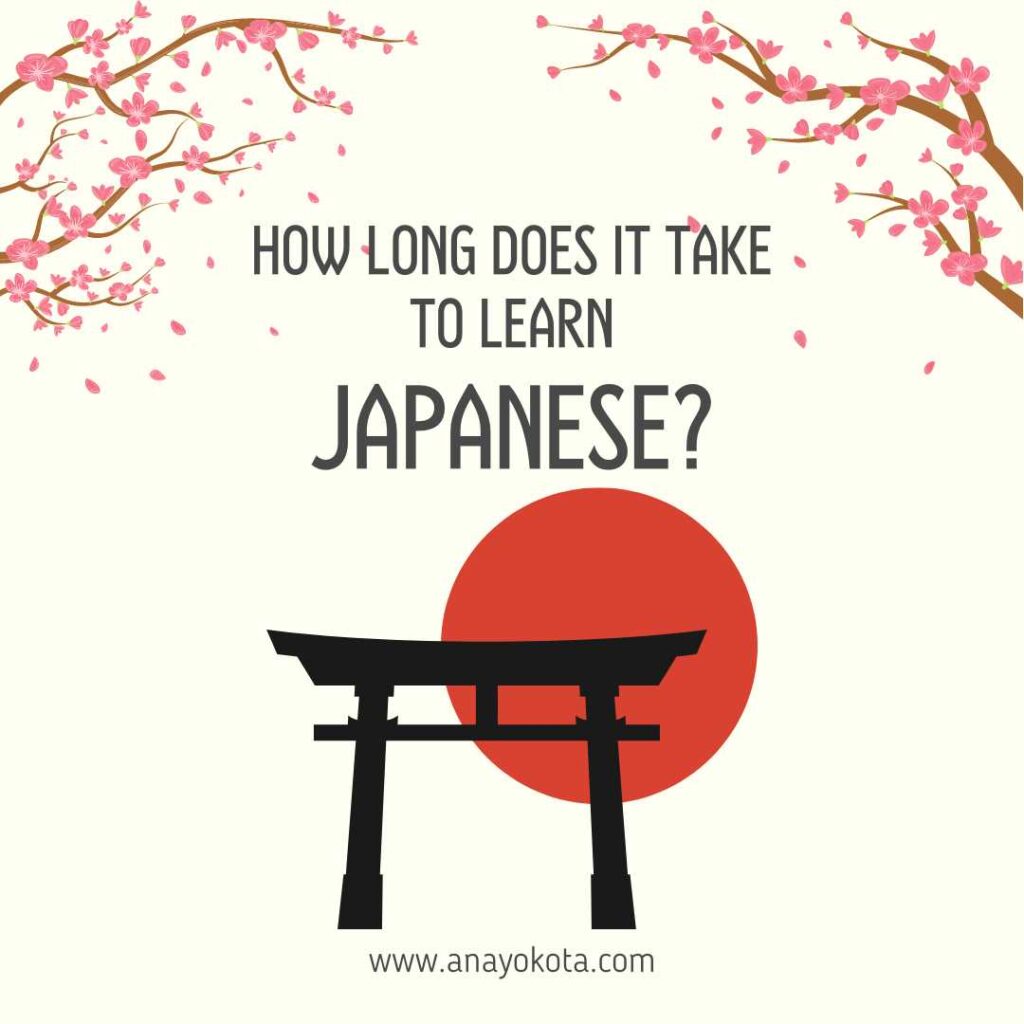
Factors That Affect Learning Japanese
When trying to learn any language without others around you, you may also be asking yourself how long does it take to learn Japanese on your own?
Like any other language, there is no specific timeframe regarding the time it takes to learn Japanese.
A good benchmark is the Japanese Language Proficiency Test (JLPT), which estimates that it takes about 3000-4800 hours of study to become fluent (i.e., pass the highest level of the JLPT tests).
Though your skills and prior experience may help you cut these hours down, let’s have a look.
Prior Language Experience
One of the greatest determinants of the time it takes to learn Japanese is prior language experience.
Whether you know much about the languages of the Far East, many people assume that the languages originating from this world are similar.
While that is not necessarily true, Korean and Japanese have adopted Chinese characters to some extent.
To what extent did they integrate it into their language exactly?
The Japanese use Chinese characters, or kanji, in nearly every sentence, but we’ll get to that later.
Due to Chinese and Koreans’ exposure to these characters, they find it much easier to memorize certain vocabulary in Japanese.
Furthermore, Korean shares a sentence structure similar to Japanese: subject, object, and verb.
How long does it take to learn Japanese if you know Chinese?
Honestly, the Kanji part (more on Kanji below) will be relatively easy as mentioned above.
However, the language itself and sentence structures are different, which may take a little more effort to learn.
I was told that it is easier to learn Japanese with a Korean background more than learn Japanese with a Chinese background.
This is simply because more words and grammar structures are the same in Korean and Japan.
But it all boils down to a common questions friends will ask me, “Ana, just how many hours a day should I study Japanese?”
In the table below from the Japanese Language Education Centre, you can see what a great impact prior language experience has on learning time:
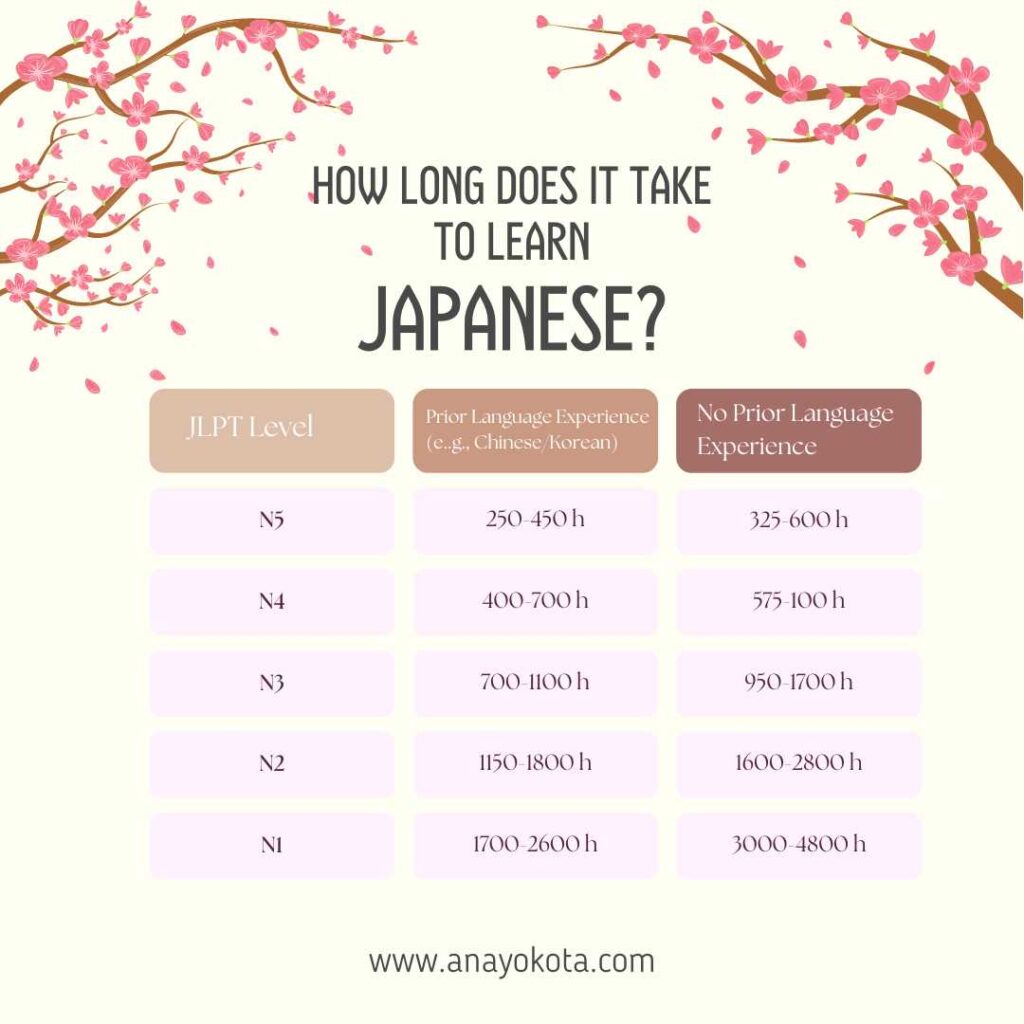
Motivation And Dedication
Certainly, the greatest factor in learning nearly anything would be the willpower to go at it every day.
Languages won’t just “come to you” like they used to when you were a kid.
There is a common understanding among language learners that language acquisition is more correlated with frequency (or rather consistency) than quantity (at a time).
So, when learning Japanese, instead of putting in 4 hours in one day, once a week, you should rather put in 45 minutes once a day for a whole week.
Ideally, it would be best to study more than that, but for most adults and many kids, learning a new language gets pushed aside due to our daily life.
Language learning can take up a lot of time and, even more importantly, energy, which brings us to the next point.
During your language learning journey, you may experience something called foreign language fatigue.
Whether you’re learning by studying textbooks or in the midst of Japanese and learning through interaction, language fatigue will most certainly get its grasp on you eventually.
You’ll grow tired of hearing new words and grammatical structures – essentially, you must remind yourself to stay strong and motivated.
Keeping your goals and main motivations in mind is a strong tool to keep going!
Learning Environment
Our environment greatly impacts our mental strength and well-being, and it should come as no surprise that this relationship holds during language learning.
Keeping a clean environment helps clear your mind (though I’ve seen the opposite, where people seem to work better when working in a cluttered environment).
Stick to what works for you!
Regarding online vs. in-person learning, both are viable options. Learning online has the bonus of flexibility, while in-person has the perk of being more immersive and forcing you to focus harder.
In other words, there’s no opportunity to quickly google the translation or kanji for a certain word. Hybrid learning seems to be a great midway to learning Japanese.
I also strongly recommend to learn Japanese by reading more of what you enjoy.
For my cousin, she is currently learning Japanese through manga books (Japanese comic books).
Whereas, I prefer to learn Japanese through cookbooks).
Being married to a Japanese American who speaks Japanese fluently is a huge bonus for me when learning how to learn Japanese.
I find myself asking my husband constantly, “How do you say, ‘how long in Japanese?’ or ‘I love you in Japanese?’”
My husband loves when I ask him because he is proud of his Japanese heritage and loves that I want to continue to learn more about Japan.
Language Immersion
Some people are so focused on shortening how long it takes to learn Japanese that they forget to enjoy it.
Language is an interactive and stimulating way to learn Japanese and an absolute necessity. There are multiple ways to learn Japanese through immersion.
Is it possible to learn Japanese through games? Or through pop-culture?
The answer is, “YES!”
Here are some tips for learning Japanese through immersion:
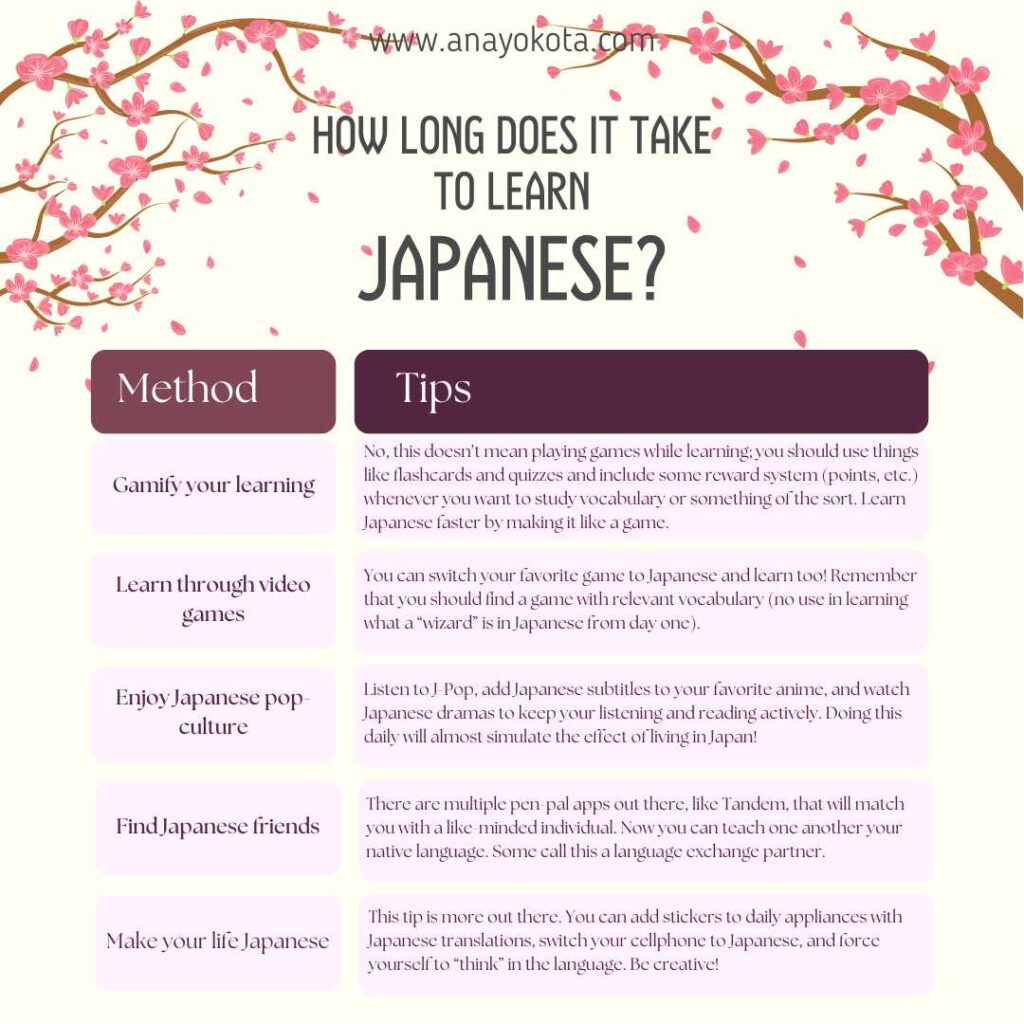
Japanese Language Structure
The Japanese language structure may seem very complicated to most, but the grammar may be more straightforward than in English.
Using a subject-object-verb (SOV) structure is quite straightforward. Your time will likely be spent learning vocabulary and kanji.
One thing that may seem confusing is the different types of scripts the Japanese use to read and write.
Hiragana And Katakana
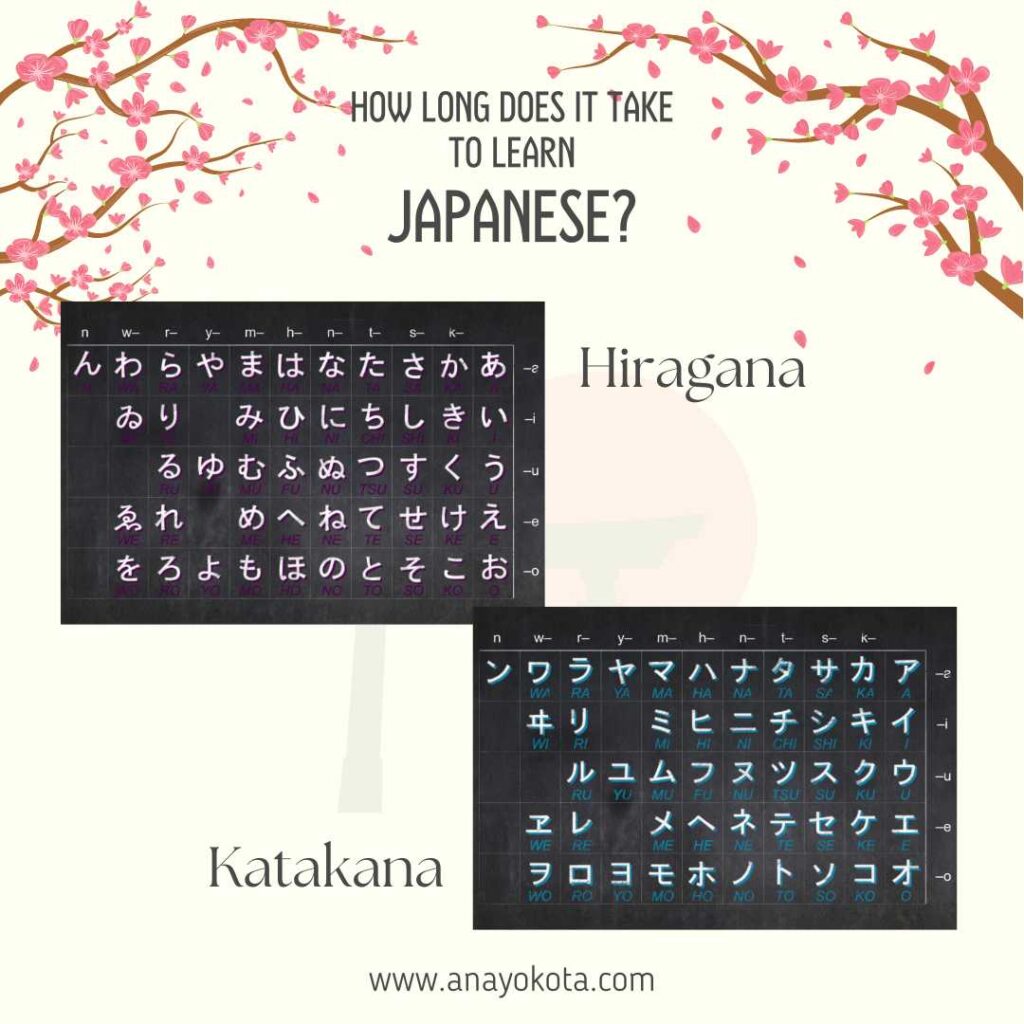
The first two are hiragana and katakana, known together as kana.
Kana are phonetic characters, and when they are written above the Chinese characters, they become known as furigana which is an aid to let you know how a word is pronounced.
There are differences between the hiragana and katakana, though.
Hiragana is the original Japanese script used before Chinese characters were imported and integrated into the language.
These characters are rounded and syllabic. It indicates particles (a special feature of Japanese grammar) and common vocabulary.
Katakana is a counterpart of hiragana used to write words of foreign origin. The same number of characters exist for both hiragana and katakana.
Each one should take you no more than 3 hours to learn if you fully commit, though it may take longer to get comfortable reading it.
Kanji
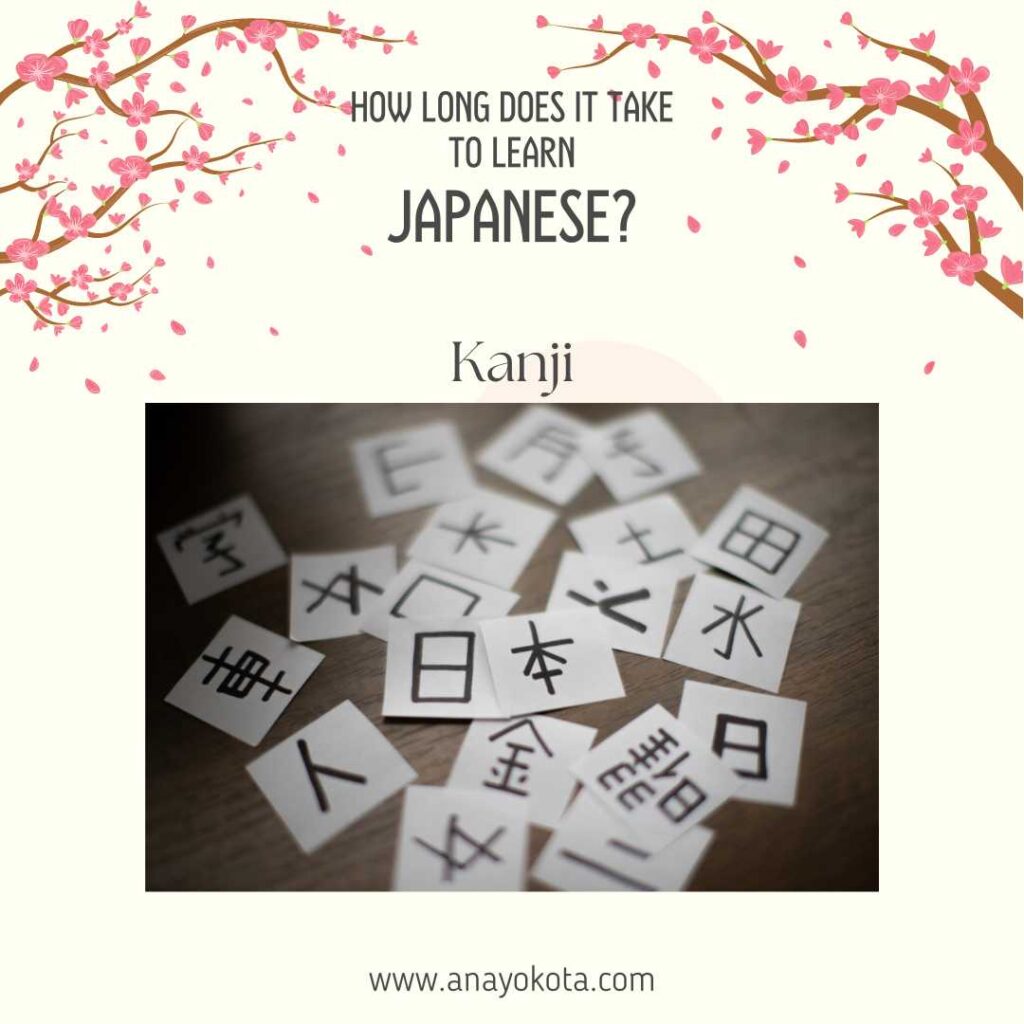
Kanji is arguably the most difficult part of learning the Japanese language.
Even people who can speak Mandarin often have a hard time deciphering these characters as they are derivative of Mandarin but have different meanings and pronunciations.
You should know about 2,000+ kanji to be considered literate, though there are exponentially more.
In Summary on How Long Does It Take To Learn Japanese
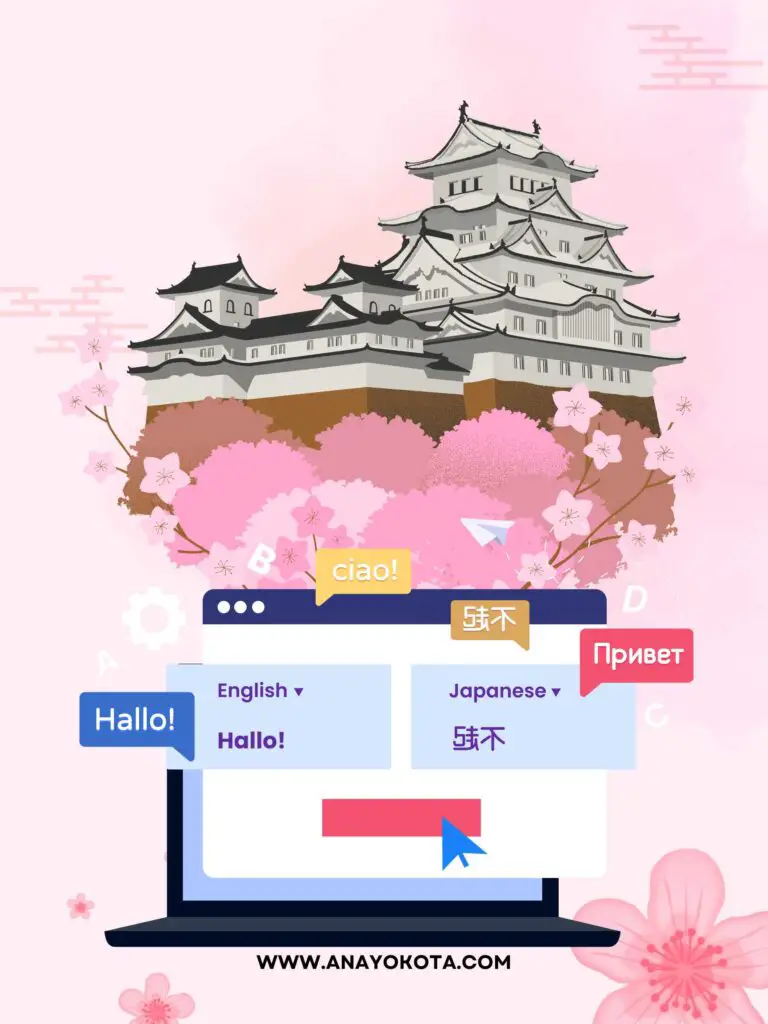
If you are motivated and see yourself working or studying in Japan, you will certainly have a great time learning Japanese.
Even if you’re doing it for fun, it may be to your benefit for multiple reasons.
The bonuses are limitless, from making friends online or meeting tourists to enjoying your favorite anime or literature in its intended language!
Start with the simple Japanese words, Japanese lessons, and of course Japanese culture to help you learn Japanese faster. Who knows, may you can learn Japanese in 6 months!
If you are interested to learning how long does it take to learn korean, this article is coming soon! In the meantime, if you would like to learn more about Japanese content, here is a fun list:




